| Srl | Item |
| 1 |
ID:
155341
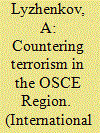

|
|
|
|
|
| Summary/Abstract |
THE HEINOUS ACTS OF TERROR in the first few months of the current year, indiscriminate slaughter of civilians, persecution of whole communities (particularly on the grounds of religion or belief), metro bombings, and terrorist attacks against major European cities continue to shock and horrify. Is it possible to take effective action against such atrocities? What can be done to prevent the assassination of an ambassador or a grenade launcher attack on a consulate general?* How can we enable people to travel by public transport, attend public events, and meet with friends in cafés and restaurants without fearing for their lives or for the lives of their children, friends and relatives?
|
|
|
|
|
|
|
|
|
|
|
|
|
|
|
|
| 2 |
ID:
143040
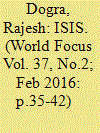

|
|
|
|
|
| Summary/Abstract |
The actions of ISIS in the past few years have left the whole international community to stare feared with awe. The pace with which ISIS is expanding and the number of victims that leaves behind, has caused severe alert to all international organizations and States. The problems of the funding of ISIS, the support from other terrorist groups, the internet propaganda and the foreign terrorist fighters are phenomena that are still hard to be 100% traced and solved.
|
|
|
|
|
|
|
|
|
|
|
|
|
|
|
|
| 3 |
ID:
178943
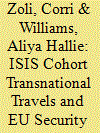

|
|
|
|
|
| Summary/Abstract |
We explore the underappreciated role of organizational tactics in terrorist violence in an understudied single case: ISIS’s execution of the November 13, 2015 Paris attacks. It is one of the first systemic reconstructions of the journeys made by two ISIS strike cohorts in the coordinated attacks, as teams traveled from the Levant to Europe. In contrast to other high-profile attacks, terrorism scholars have not undertaken a detailed reconstruction of this event, even while open source information is now available. By examining the transnational travels of foreign terrorist fighters, we identify ISIS’s distinctive terrorist outsourcing strategy in which operatives used their experiences to adapt to changing security conditions, while EU governments revealed limited responses. Both elements in this tightly-knit dynamic—terrorist outsourcing savvy using FTFs and EU security policy failures—were necessary to achieve this high-profile attack. The essay contributes to descriptive empirical and theoretical knowledge of terrorist tactical innovation and adaptive operational learning, as these capacities are enhanced by on-the-ground organized networks to increase organizational (versus lone-wolf) campaign success. By using a single case interdisciplinary and exploratory framework, terrorism studies can delve deeper into superficially understood phenomena to isolate concepts with future cross-case value, such as cohorts and tactical adaptation.
|
|
|
|
|
|
|
|
|
|
|
|
|
|
|
|
| 4 |
ID:
170855
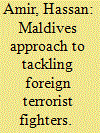

|
|
|
| 5 |
ID:
179974
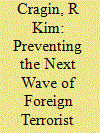

|
|
|
|
|
| Summary/Abstract |
Foreign terrorist fighters (FTFs) signify a unique threat. Islamic State leaders recruited many of them specifically to conduct terrorist attacks against the West. Many of these external operations have proven to be sophisticated and deadly, such as the November 2015 attacks in Paris. Yet the threat posed by FTFs goes beyond orchestrating attacks. In the past, they returned home to build networks that, in turn, facilitated a new generation of FTFs. Even more challenging, today’s FTFs can interact with recruits on social media to inspire attacks. This article addresses the threat of a new wave of FTFs and potential countermeasures. It presents findings from a comparative analysis of Tunisia and Algeria, concluding that to reverse the compounding nature of FTFs, countries must identify the potential threat from the outset, put appropriate legal measures in place, adequately fund judicial systems, and institute re-integration programs.
|
|
|
|
|
|
|
|
|
|
|
|
|
|
|
|